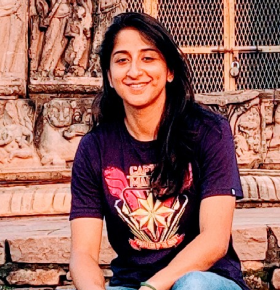Teaching
Academic Programmes
5-Year B.A., LL.B. (Hons.)
Courses
Seminar Course | Principles of Indian Family Law (July-September, 2020)
Education
- B.A., LL.B. (Hons.), National Law School of India University, Bangalore (2012-17)
- LL.M. University of Cambridge (2019)
- Ph.D., University of Cambridge (2020 onwards)
Profile
Shraddha Chaudhary is a Lecturer at Jindal Global Law School, O.P. Jindal Global University (currently on leave), and a Ph.D Researcher at the Faculty of Law, University of Cambridge. Her Ph.D research is focused on de-facto consensual cases under the Protection of Children from Sexual Offences Act, 2012 (POCSO). She received the Cambridge International Scholarship (full tuition and stipend) from the Cambridge Commonwealth and International Trust for the duration of her Ph.D. In 2019, she completed her LL.M. (first class honours in all subjects) from the University of Cambridge, for which she had received the Rajiv Gandhi Cambridge Scholarship (full tuition and stipend) from the Rajiv Gandhi Foundation and the Cambridge Commonwealth and International Trust. She is also an alumna of the B.A., LL.B. course of the National Law School of India University Bangalore.
Before beginning her Master’s degree, Shraddha was a Research Assistant (Legal) with the Child Protection Team at the Centre for Child and the Law, where she was the second lead author for two (Andhra Pradesh and Maharashtra) of the five state reports on the Functioning of Special Courts under the POCSO Act, assisted with several other research projects (for instance, on the provision of Legal Aid to Children in Conflict with the Law in Karnataka) and participated in the Northern, Southern, Kashmir and National Round Table Conferences on the Effective Implementation of the Juvenile Justice (Care and Protection) Act, 2015, focused on the linkages of POCSO and juvenile justice, conducted by UNICEF and the Supreme Court of India.
Shraddha has taught courses on Criminal Procedure and Constitutional Law at O.P Jindal Global University (2019-20), a seminar course at NLSIU, Bangalore (July-Sept 2020) and a single credit course at NLSIU Bangalore (2018). Her areas of interest are Substantive and procedural criminal law, Family law, the intersection of law (and in particular criminal law and family law), with feminism, and the treatment of women and children in the Indian criminal justice system.
Research Interests/Work
Work with the Centre for Child and the Law, NLSIU:
Study on the working of Special Courts under the POCSO Act in Maharashtra (Published as a Report, 2017)
Study on the working of Special Courts under the POCSO Act in Andhra Pradesh (Published as a Report, 2017)
Field Research on the Compliance of Chandrapur District with the Structural and Procedural Requirements of the POCSO Act (2017)
Access to Legal Aid among Children in Conflict with Law in Karnataka (Published as a Report, 2018)
Study on the working of Special Courts under the POCSO Act in Maharashtra (Published as a Report, 2017)
Study on the working of Special Courts under the POCSO Act in Andhra Pradesh (Published as a Report, 2017)
Field Research on the Compliance of Chandrapur District with the Structural and Procedural Requirements of the POCSO Act (2017)
Access to Legal Aid among Children in Conflict with Law in Karnataka (Published as a Report, 2018)
Publications
Journal Articles and Book Chapters
- Law Commission of India and the Debate on the Age of Consent, 59(6) Economic and Political Weekly (2024)
- A Critical Examination of the Discourse of Indian Courts on (De)criminalisation in Vidyasar, Pattanayak and Narasappa (eds.), Constitutional Ideals: Development and Realisation through Court-led Justice (Oakbridge Publishing) (2023).
- Criminalisation Without an Object: Critical Reflections on the Muslim Women (Protection of Rights on Marriage) Act, 2019, 17(2) Socio-Legal Review, NLSIU (2022).
- Review of Solanke, Iyiola (ed), On Crime, Society, and Responsibility in the work of Nicola Lacey, OUP (2020) 85(3) Modern Law Review (2022).
- Review of Sen and Ghosh (eds.), Love, Labour and Law: Early and Child Marriage in India Sage (2020) 35(1) International Journal of Law, Policy and the Family (2021).
- The Compelling Public Interest in Testimonial Compulsion: A Critique of the Supreme Court of India’s Decision in Ritesh Sinha v State of Uttar Pradesh, 20(2) Oxford University Commonwealth Law Journal (2020).
- Reforming the Legal Framework for Child Sexual Abuse in India, 40(1) Statute Law Review (2020).
- Navtej Johar v. Union of India: Love in Legal Reasoning, 12(4) NUJS Law Review (2019).
- Reconceptualizing Rape in Law Reform, 13(2) Socio-Legal Review, NLSIU (2018).
Newspaper Articles
- The Child’s Right to Dignity (The Hindu, 15.08.2017)
- After Ruling Sex with a Minor Wife as Rape, SC Needs to Examine India’s Child Abuse Law (The Print, 12.10.2017)
- Tougher isn’t Better (Indian Express, 24.04.2018)
- Live and Let Live-In (The Hindu, 25.09.2019)
- A Marriage Story for Everyone (The Hindu, 14.02.2020)
- Putting Victims on Trial (The Hindu, 16.07.2020)
Others:
- Independent Thought v. Union of India and the Unconstitutionality of Marital Rape, Socio Legal Review Forum, NLSIU (11.06.2017)
- Charges and Sentencing Patterns under the POCSO Act, 2012 in Implementation of the POCSO Act, 2012 by Special Courts: Challenges and Issues, 51 (National Printing Press, Bengaluru, 2018)
- “Love”, Consent and the POCSO in Implementation of the POCSO Act, 2012 by Special Courts: Challenges and Issues (National Printing Press, Bengaluru, 2018)
- Frequently Asked Questions on The Juvenile Justice (Care and Protection) Act, 2015 and The Juvenile Justice (Care and Protection) Model Rules, 2016
- Band-aid on a Septic Wound: The Anti-Trafficking Bill, 2018 (Law School Policy Review, 10.08.2018)
- Criminalisation and Privacy: Examining the State’s Right to Interfere in the “Private Sphere” through imposition or lifting of Criminal Sanction, IACL-AIDC Blog, Symposium on ‘Section 377 (20.09.2018)
- The Supreme Old Boys’ Club, Socio-Legal Review Forum, NLSIU (18.06.2019)
- The Right to Love and the Right to Leave: Recognising Autonomy through Unilateral No-Fault Divorce (Indian Constitutional Law and Philosophy Blog, 06.04.2020)
For the full list of blogs, newspaper editorials and podcasts, click here.


